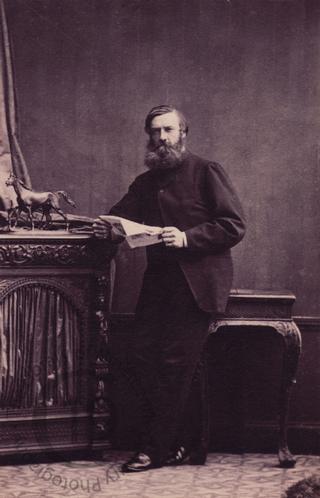
Major John Stokes
A carte-de-visite portrait of Major John Stokes (1825-1902).
An inked inscription verso in a period hand identifies the sitter as Major John Stokes of the Danube European Commission. The inscription also mentions Galatz, a Romanian city on the banks of the Danube which was the administrative centre of the commission.
According to his obituary in the Times (18 November 1902): ‘Lieutenant-General Sir John Stokes R.E. died at his residence, The Spring House, Ewell, Surrey, yesterday morning, of apoplexy. He was the second son of the Rev John Stokes of Cobham, Kent, where he was born in 1825. Educated at Rochester Proprietary School and at the Royal Military Academy, he passed into the Royal Engineers in 1843. Two years later he was off to South Africa, where he laid the foundations of a career of tireless energy which was to extend over half a century. He took part in the Kaffir wars of 1845-51 [sic] and 1850-52 [sic], and was several times mentioned in despatches. In 1855 he was entrusted by the Secretary of State for War (Lord Panmure) with the formation of the Engineer corps for the Anglo-Turkish contingent, and was present at the fall of Sevastopol, afterwards proceeding with the contingent to Kertch. He was her late Majesty’s Commissioner on the European Commission formed by the Treaty of Paris in 1856 to open the mouth of the Danube, and acted in that capacity for over 15 years, during which time order was restored to the delta of the Danube, and the river at its mouth and for 100 miles above it was made navigable for large ships. In 1871 he was made a Companion of the Bath. In 1872 he was appointed to command the Royal Engineers in South Wales, and in the following year he was sent to Constantinople as a member of the International Commission on Tonnage and the Suez Canal Dues. A year later he proceeded to the Suez Canal to report upon its condition, and then returned home to command the School of Military Engineering at Chatham. His crowning work, however, was the signature, in 1876, of the convention with M. de Lesseps whereby the Suez Canal Company, with the concurrence of the European Powers, withdrew all protests against the Porte and gave entire effect to the recommendations of the Constantinople Commission of 1873. The following year he was created a K.C.B. In 1879 Sir John Stokes was appointed member of an international commission to decide Alexandria Harbour dues, and in 1880 he was a member of the Royal Commission on Ships’ Tonnage Measurement, under the presidency of Mr E. Norwood, M.P. His first War Office appointment came in 1881, when he became D.A.G. for Royal Engineers at Headquarters – a post which he held for five years, and during his tenure of which he made the arrangement for the despatch of Engineers to Egypt and the Sudan. In 1887 Sir John Stokes was put upon the retired list of the Army, but he retained to the last his interest in the Suez Canal Company, of which he was vice-president, for it was only a fortnight ago that he attended a meeting in Paris. He married, in 1849, a daughter of Mr Charles Maynard, of Grahamstown, Cape Colony.’
Photographed by Camille Silvy of London on 30 April 1863.
Code: 124158




